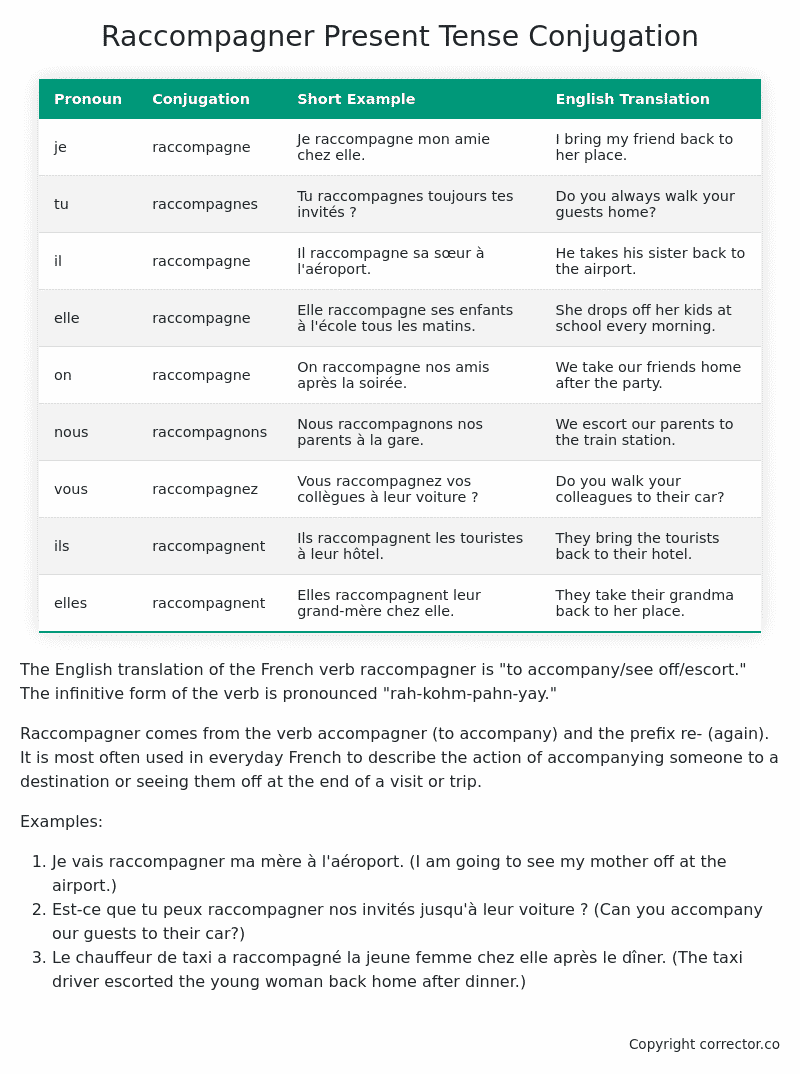Le Present (Present Tense) Conjugation of the French Verb raccompagner
Introduction to the verb raccompagner
The English translation of the French verb raccompagner is “to accompany/see off/escort.” The infinitive form of the verb is pronounced “rah-kohm-pahn-yay.”
Raccompagner comes from the verb accompagner (to accompany) and the prefix re- (again). It is most often used in everyday French to describe the action of accompanying someone to a destination or seeing them off at the end of a visit or trip.
Examples:
- Je vais raccompagner ma mère à l’aéroport. (I am going to see my mother off at the airport.)
- Est-ce que tu peux raccompagner nos invités jusqu’à leur voiture ? (Can you accompany our guests to their car?)
- Le chauffeur de taxi a raccompagné la jeune femme chez elle après le dîner. (The taxi driver escorted the young woman back home after dinner.)
Raccompagner – About the French Present Tense
To take a deep dive into all the French tenses then see our article on Mastering French Tense Conjugation.
Common Everyday Usage Patterns For Le Present
Interactions with Other Tenses
Table of the Present Tense Conjugation of raccompagner
| Pronoun | Conjugation | Short Example | English Translation |
|---|---|---|---|
| je | raccompagne | Je raccompagne mon amie chez elle. | I bring my friend back to her place. |
| tu | raccompagnes | Tu raccompagnes toujours tes invités ? | Do you always walk your guests home? |
| il | raccompagne | Il raccompagne sa sœur à l’aéroport. | He takes his sister back to the airport. |
| elle | raccompagne | Elle raccompagne ses enfants à l’école tous les matins. | She drops off her kids at school every morning. |
| on | raccompagne | On raccompagne nos amis après la soirée. | We take our friends home after the party. |
| nous | raccompagnons | Nous raccompagnons nos parents à la gare. | We escort our parents to the train station. |
| vous | raccompagnez | Vous raccompagnez vos collègues à leur voiture ? | Do you walk your colleagues to their car? |
| ils | raccompagnent | Ils raccompagnent les touristes à leur hôtel. | They bring the tourists back to their hotel. |
| elles | raccompagnent | Elles raccompagnent leur grand-mère chez elle. | They take their grandma back to her place. |
Other Conjugations for Raccompagner.
Le Present (Present Tense) Conjugation of the French Verb raccompagner (this article)
Imparfait (Imperfect) Tense Conjugation of the French Verb raccompagner
Passé Simple (Simple Past) Tense Conjugation of the French Verb raccompagner
Passé Composé (Present Perfect) Tense Conjugation of the French Verb raccompagner
Futur Simple (Simple Future) Tense Conjugation of the French Verb raccompagner
Futur Proche (Near Future) Tense Conjugation of the French Verb raccompagner
Plus-que-parfait (Pluperfect) Tense Conjugation of the French Verb raccompagner
Passé Antérieur (Past Anterior) Tense Conjugation of the French Verb raccompagner
Futur Antérieur (Future Anterior) Tense Conjugation of the French Verb raccompagner
Subjonctif Présent (Subjunctive Present) Tense Conjugation of the French Verb raccompagner
Subjonctif Passé (Subjunctive Past) Tense Conjugation of the French Verb raccompagner
Subjonctif Imparfait (Subjunctive Imperfect) Tense Conjugation of the French Verb raccompagner
Conditionnel Présent (Conditional Present) Tense Conjugation of the French Verb raccompagner
Conditionnel Passé (Conditional Past) Tense Conjugation of the French Verb raccompagner
L’impératif Présent (Imperative Present) Tense Conjugation of the French Verb raccompagner
L’infinitif Présent (Infinitive Present) Tense Conjugation of the French Verb raccompagner
Struggling with French verbs or the language in general? Why not use our free French Grammar Checker – no registration required!
Get a FREE Download Study Sheet of this Conjugation 🔥
Simply right click the image below, click “save image” and get your free reference for the raccompagner Present Tense tense conjugation!

I hope you enjoyed this article on the verb raccompagner. Still in a learning mood? Check out another TOTALLY random French verb present conjugation!


